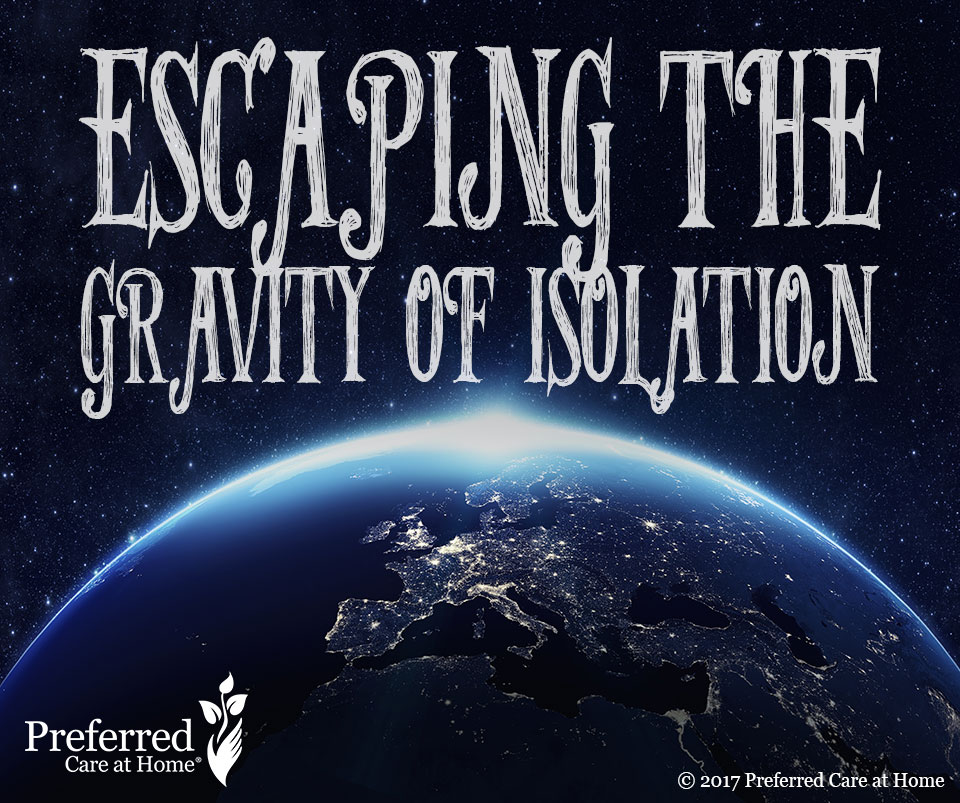Escaping the Gravity of Isolation
Published March 16, 2017 by Ashly Luckose, Esq. in Home Care Services, Senior Health & Wellness, Uncategorized

Loneliness and isolation can feel overwhelming. It can make you feel like you are a couple thousand miles away from humanity. Escaping Isolation.
Loneliness and isolation can feel overwhelming. It can make you feel like you are a couple thousand miles away from humanity. Hopefully, you always and eventually come to realize that you are not actually alone, certainly not thousands of miles away from your fellow humans.
Of course, like always, there is an exception to what I just said. Alfred Worden is the exception.
Worden, an astronaut, actually held the Guinness world record for being ‘the most isolated human’ during the 1971 Apollo 15 mission to the Moon, during which he was 2,235 miles away from the closest humans, his crew mates, David Scott and James Irwin.
And even Worden had Houston if he really felt the need to talk. Plus, in an interview with the BBC, he aptly and interestingly distinguished between being alone and being lonely. Similar words, similar concepts, but they’re not the same thing.
As Worden put it: “I was alone but I was not lonely.”
Feeling alone is usually temporary. The real issue is feeling lonely, or more specifically, isolated.
I like the following definition of isolation by AARP, a non-profit organization that advocates on the behalf of the elderly:
“Isolation is more than being alone. It’s the result of feeling detached physically or psychologically, or being disconnected from support groups of family, friends and community.”
As people age, their lives become more and more isolated, to the point that they may feel like they’ve taken Worden’s Guinness record.
But they need not feel this way.
AARP suggests the following tips in their campaign, connect2affect, which aims to help the elderly reconnect and help break out of their isolation:
- Nurture and strengthen existing relationships.
- Ask people over for coffee, or invite them to join you for a trip to a museum or a movie. Schedule a time each day to call a friend or visit someone.
- Meet your neighbors — young and old.
- Use social media like Facebook to stay in touch with long-distance friends or write an old-fashioned letter.
- Stay physically active and include group exercise in the mix, like joining a walking club.
- Take a class to learn something new and, at the same time, expand your circle of friends.
- Revisit an old hobby you’ve set aside and connect with others who share your interests.
- Volunteer to deepen your sense of purpose and help others.
- Visit your local community wellness or senior center and become involved in a wide range of interesting programs.
- Check out faith-based organizations for spiritual engagement, as well as to participate in activities and events.
- Don’t let being a non-driver stop you from staying active.
- Find out about your transportation options.
- Get involved by taking on a cause, such as making your community more age-friendly.
Finally, if you feel the need for more even after following the tips above, you can always supplement your life with quality companionship, which is easier to find than you may think! Escaping Isolation
#independence #isolation #practicaltips #loneliness #seniorcare #mentalhealth #aging #community #socialconnection #wellbeing #PreferredCareAtHome #SeniorCare #InHomeCare #ElderlyCare #HomeCareServices #AgingInPlace #DementiaCare #AlzheimersCare #PersonalCare #CompanionCare #LiveInCare #RespiteCare #CaregiverSupport #CompassionateCare #IndependentLiving #SeniorSupport #HealthAtHome #FamilyCare #FranchiseOpportunity #DignityInAging
Escaping Isolation
If you have questions about senior home
care services or if you want to start care:
Related Posts

January 27, 2025
Is There a Food Allowance Card for Seniors?
Jody Guerrieri, RN.

January 27, 2025
What Causes Glassy Eyes in the Elderly?
Jody Guerrieri, RN.

January 27, 2025
What Age Is Considered a Senior Citizen?
Jody Guerrieri, RN.
Helping seniors age in place, with dignity & grace.